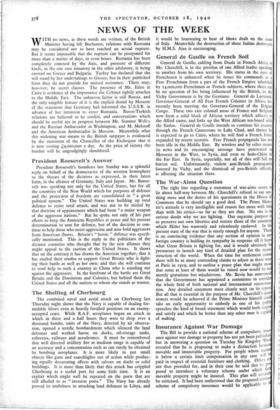The War-Aims Question
The right line regarding a statement of war-aims seems lie about half-way between Mr. Churchill's refusal to say any thing more and the desire of his questioners in the House o Commons that he should say a good deal. The Prime Minis ter's attitude is very intelligible and reason lies more with hi than with his critics—so far as they are that. No one is serious doubt why we are fighting. Our supreme purpose to preserve our own liberties and restore those of the countr which Hitler has wantonly and relentlessly enslaved. In th present state of the war that is surely enough for anyone. Ther is no convincing evidence that any section of opinion in an foreign country is holding its sympathy in suspense till it hear what Great Britain is fighting for, and it would obviously premature to launch any kind of detailed plan for the mon struction of the world. When the time for settlement corn there will be as many contending claims to adjust as there we at Paris in 1919, and to outline a peace plan that might me that some at least of them would be raised now would be no merely gratuitous but mischievous. Mr. Bevin has announc that the Government has appointed a committee to conside the whole field of both national and international reconstruc tion. Any detailed statement must clearly wait on its report But all that is essential in the purpose of Mr. Churchill's ques tioners would be achieved if the Prime Minister himself cool take an early opportunity to embody in one of his pub]] speeches the kind of broad statement which would both inspu; and satisfy and which he better than any other man is capab] of making.






























 Previous page
Previous page